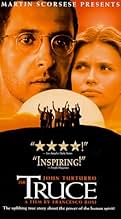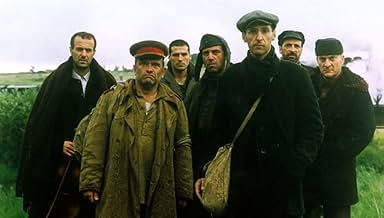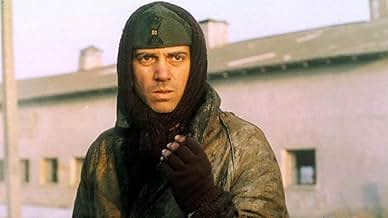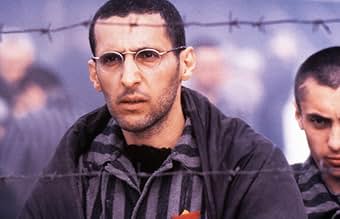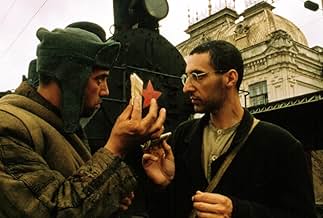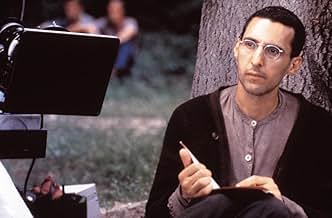PUNTUACIÓN EN IMDb
6,6/10
1,9 mil
TU PUNTUACIÓN
Sigue autobiográfica "The Reawakening" de Primo Levi.Sigue autobiográfica "The Reawakening" de Primo Levi.Sigue autobiográfica "The Reawakening" de Primo Levi.
- Dirección
- Guión
- Reparto principal
- Premios
- 7 premios y 9 nominaciones en total
Tatyana Cherkasova
- Irina
- (as Tatyana Meshcherina)
Reseñas destacadas
8=G=
"The Truce" chronicles the homeward bound odyssey of an Auschwicz survivor - Primo played by Turturro - in the chaos immediately following the fall of the Third Reich. Although Primo, an Italian Jew, is the central character, the camera spends more time on the people, places, and vicissitudes which he encounters on his journey from Krakow to Turin. This beautifully shot, somber film with an abundance of extras and a minimal core cast has no specific focus. The interest in this film is in the story and the story is in the telling. A very worthy cinematic endeavor.
The movie which held great promise seemed to stop short of coherency. The dialog was hard to understand and the characters never really were fully developed. Some things should be left alone as books. This was one of them.
The broad scope of the book could not be shown and the internal thought processes simply did not make the transition.
The broad scope of the book could not be shown and the internal thought processes simply did not make the transition.
I have read "Se questo è un uomo" 15 times, and I also consider "La Tregua" as one of the most extraordinary Odysseys of our times. I can hardly find any of Levi's masterpieces in this hodgepodge of episodes, hardly connected to each other and with barely any historical explanation of the events. Several comments about god and religion reported in the movie were not even present in the book, giving the impression that the director wanted to twist Levi's thought to serve his own philosophical agenda. The movie relies too much on images and too little on Levi's own considerations. Some effort has been put in trying to represent the chaotic world of those times, but I would have appreciated less scenic representation and more intimate comments.
There are books and films. Two different ways of telling a story. Sometimes films are based on books. In that case one does good by not concentrating on the book and see the film as an independent work of art. Barthes already proclaimed 'the death of the writer', the discourse is not a message of the writer. But sometimes it's impossible to ignore the writers' work and his message. This is the case with one of this centuries' most important writers, Primo Levi. He didn't just write books, but was able to put in words his very own experiences in the German Lagers and this way put it in a much broader sense, he wrote history.
Many years before, Rosi had succesfully filmed 'christ stopped at Eboli', which was also based on an autobiography (Carlo Levi, not related to Primo) of the fascist period. Rosi did well not to choose Primo Levi's 'if this is a man' (se questo e un uomo), which describes the unimaginable experiences of Levi in the German Lager, he chose what could be called its' 'sequel'. 'the truce' ('la tregua') in which Levi describes his journey home from the camp in Poland to Turin, Italy, which took him an absurd nine months.The film starts when killingfactory Auschwitz-Birkenau is liberated by the Russians and the survivors are freed and put in trains, not to go home directly, but to be send to other camps. From there the journey continues, by train, by foot, meeting various characters. Levi, played by John Torturro, is a silent man who now and then expresses wise words or memorable sentences, but somehow never really makes you think. It's a man we follow, but doesn't touch us, let alone move us. This is not Turturro's fault, he gives a fairly good performance, but Rosi wants too much tell an important story, forgetting the ones who ARE the story; namely the characters. None of them is very well worked out. Take the Greek Nahum, in the book a surpising, colourful person, here just one-dimensional. Symbolism is overly present; Levi who doesn't want to throw away his campjacket, 'to remember' is credible, but the survivors are faced with german prisoners twice and it's given an unconvincing weight, as one German throws himself on his knees, when he sees Levi and his yellow star of David, far too grotesque. Another unconvincing role is given to the music, it's overly present, even a violin is stolen (where Rosi had this idea from is very unclear??) for no good reason. Music should be on the background.
I am sure Rosi had good intentions, but sometimes it's better to read and reread a book and try to reach as many people as possible in that way.
**out of ***** If this is a man (se questo e un uomo)-primo Levi The truce (La tregua) - Primo levi The saved and the drowned (I sommersi e i salvati)-Primo levi
Many years before, Rosi had succesfully filmed 'christ stopped at Eboli', which was also based on an autobiography (Carlo Levi, not related to Primo) of the fascist period. Rosi did well not to choose Primo Levi's 'if this is a man' (se questo e un uomo), which describes the unimaginable experiences of Levi in the German Lager, he chose what could be called its' 'sequel'. 'the truce' ('la tregua') in which Levi describes his journey home from the camp in Poland to Turin, Italy, which took him an absurd nine months.The film starts when killingfactory Auschwitz-Birkenau is liberated by the Russians and the survivors are freed and put in trains, not to go home directly, but to be send to other camps. From there the journey continues, by train, by foot, meeting various characters. Levi, played by John Torturro, is a silent man who now and then expresses wise words or memorable sentences, but somehow never really makes you think. It's a man we follow, but doesn't touch us, let alone move us. This is not Turturro's fault, he gives a fairly good performance, but Rosi wants too much tell an important story, forgetting the ones who ARE the story; namely the characters. None of them is very well worked out. Take the Greek Nahum, in the book a surpising, colourful person, here just one-dimensional. Symbolism is overly present; Levi who doesn't want to throw away his campjacket, 'to remember' is credible, but the survivors are faced with german prisoners twice and it's given an unconvincing weight, as one German throws himself on his knees, when he sees Levi and his yellow star of David, far too grotesque. Another unconvincing role is given to the music, it's overly present, even a violin is stolen (where Rosi had this idea from is very unclear??) for no good reason. Music should be on the background.
I am sure Rosi had good intentions, but sometimes it's better to read and reread a book and try to reach as many people as possible in that way.
**out of ***** If this is a man (se questo e un uomo)-primo Levi The truce (La tregua) - Primo levi The saved and the drowned (I sommersi e i salvati)-Primo levi
This movie is based on the true events that took place in one of the most renowned Auschwitz prisoners Primo Levi. More specifically, it is the last book of his experiences, whereby this book starts at the moment that Auschwitz is liberated, i.e. As end of january 1945. It describes his experiences he had during his travels in the soviet liberated part of the former Nazi empire.
Note: for the people that have never heard of "Is this a Man" - which describes his experiences in Auschwitz - one of the most impressive books that I have ever read.
With great acting and stunning scenes it is an altogether convincing image of how the situation may have been in the period up to the end of the war. It does not show the continuous women abuse that was ongoing during those times, but it shows that hunger and food were a day to day battle.
Overall, this movie deserves a score of 7.4 / 10, resulting in a very well earnt 7 star IMDb rating. I am personally surprised by the fact that this movie is not more known.
Note: for the people that have never heard of "Is this a Man" - which describes his experiences in Auschwitz - one of the most impressive books that I have ever read.
With great acting and stunning scenes it is an altogether convincing image of how the situation may have been in the period up to the end of the war. It does not show the continuous women abuse that was ongoing during those times, but it shows that hunger and food were a day to day battle.
Overall, this movie deserves a score of 7.4 / 10, resulting in a very well earnt 7 star IMDb rating. I am personally surprised by the fact that this movie is not more known.
¿Sabías que...?
- CuriosidadesFinal film written and directed by Francesco Rosi.
- Citas
[last lines]
Primo Levi: [narrating] You who live secure in your warm houses, who return at evening to find hot food and friendly faces. Consider if this is a man who labors in the mud, who knows no peace, who fights for a crust of bread, who dies at a yes or a no. Meditate that this took place.
- ConexionesFeatured in The Movie Show: Episodio fechado 19 octubre 1997 (1997)
- Banda sonoraMadonina
Written by Giovanni D'Anzi (as G. D'Anzi)
Selecciones populares
Inicia sesión para calificar y añadir a tu lista para recibir recomendaciones personalizadas
- How long is The Truce?Con tecnología de Alexa
Detalles
Taquilla
- Recaudación en Estados Unidos y Canadá
- 71.448 US$
- Fin de semana de estreno en EE. UU. y Canadá
- 23.165 US$
- 26 abr 1998
- Duración2 horas 5 minutos
- Color
- Mezcla de sonido
- Relación de aspecto
- 1.85 : 1
Contribuir a esta página
Sugerir un cambio o añadir el contenido que falta

